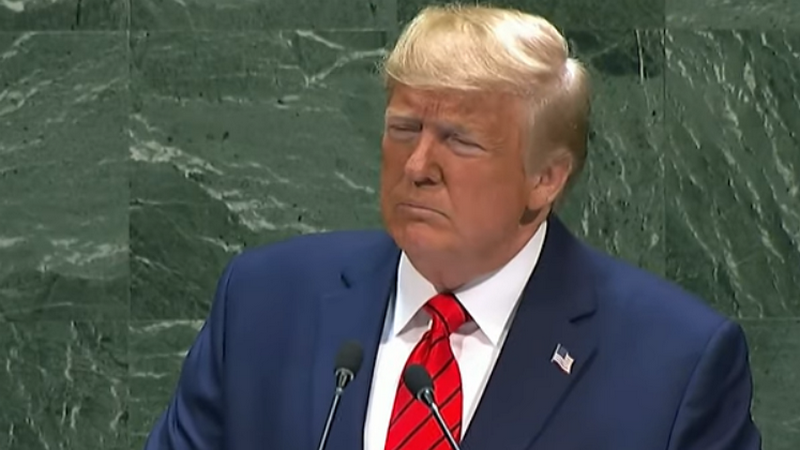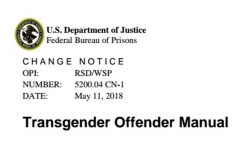At the United Nations on Monday, the Trump administration conducted a presentation on religious liberty at which Trump issued a call for the world’s nations to respect religious freedom. The timing of the religious freedom event was apparently set to compete for attention with Tuesday’s UN summit on climate change, an established fact of science that Trump has famously called “a hoax.” On Tuesday, Trump delivered—in a plodding monotone—a nationalist speech replete with right-wing talking points, padded by a one-of-these-things-is-not-like-the-other call for nations to decriminalize homosexuality.
It’s great to have the U.S. advocating for religious freedom and at least rhetorically opposing anti-LGBTQ oppression, but let’s look at the Trump administration’s actions.
On Sunday, the day before Trump’s appeal for religious freedom, Trump joined India’s Hindu nationalist Prime Minister Narendra Modi in Houston for what was essentially a giant Trump campaign rally and mutual love-fest before a cheering crowd that included many Indian Americans, now a coveted voter demographic in Texas, a state said to be vulnerable territory for Trump and the Republican Party in the 2020 election. While Modi’s appearance drew tens of thousands of fans, it also attracted protesters objecting to Modi’s human rights record. A recent letter from a group of South Asian Americans involved in philanthropy stated that under Modi’s leadership “religious minorities all across India are facing heightened levels of violence, exclusion, and discrimination.”
And it turns out that the Trump administration is continuing a religious-right tradition of eagerly working with the world’s most brutally religiously repressive regimes in order to undermine international support for reproductive rights and assert a nation’s right to enforce “traditional” views of gender, sexuality and family.
While Team Trump was at the United Nations this week, Secretary of Health and Human Services Alex Azar and Secretary of State Mike Pompeo “tag-teamed on a quiet push to the world on board with Donald Trump’s pro-life agenda,” as the Family Research Council’s Tony Perkins told FRC Action supporters in a “Washington Update” on Tuesday.
Foreign Policy reported earlier this month that U.S. diplomats were teaming up with “a ‘rogues’ gallery’ of conservative states”—including Saudi Arabia—“to roll back reproductive health gains of the past quarter-century.”
In July, Azar and Pompeo began circulating a letter asking governments to “join the United States” in opposing “harmful efforts to interpret long-standing international instruments as requiring anti-family and pro-abortion policies” and “ensuring that every sovereign state has the ability to determine the best way to protect the unborn and defend the family as the foundational unit of society vital to children thriving and leading healthy lives.” It warned against “aggressive efforts to reinterpret international instruments to create a new international right to abortion and to promote international policies that weaken the family.”
According to Foreign Policy’s Colum Lynch, “The campaign is modeled on a recent effort by the United States, Brazil, Egypt, Saudi Arabia, and several other states to denounce sexual and reproductive rights at a major conference of the World Health Organization last May.”
On Monday, Azar read the text of the joint statement the Trump administration had been recruiting other nations to sign. It said, in part, “We do not support references to ambiguous terms and expressions, such as sexual and reproductive health and rights in U.N. documents, because they can undermine the critical role of the family and promote practices, like abortion, in circumstances that do not enjoy international consensus and which can be misinterpreted by U.N. agencies.”
Who is the U.S. standing with? “We are pleased to speak on behalf of the United States of America, Bahrain, Belarus, Brazil, Democratic Republic of the Congo, Egypt, Guatemala, Haiti, Hungary, Iraq, Libya, Mali, Nigeria, Poland, Russia, Saudi Arabia, Sudan, United Arab Emirates, and Yemen.”
Several of the nations on that list have been identified by the U.S. Commission on International Religious Freedom as among the worst violators, defined as a nation “whose government engages in or tolerates particularly severe religious freedom violations, meaning those that are systematic, ongoing, and egregious.” Some nations on the list impose the death penalty for homosexuality while others have laws that punish homosexual behavior with long prison terms. For Trump’s religious-right allies, terms like “anti-family policies” and “policies that weaken the family” are barely coded language for policies that recognize and protect the rights of LGBTQ people and their families. Religious right groups strongly opposed Obama administration efforts to promote LGBTQ human rights as a foreign policy priority.
As we noted on Monday, during Trump’s remarks on religious liberty, he told survivors of religious persecution that they would always “have a place in the United States of America.” Nice rhetoric. But in reality, Trump’s administration has drastically reduced refugee admissions and is reportedly considering shutting them down completely; this month the group Refugees International gave the Trump administration an F grade for its performance on refugee and humanitarian protection.









